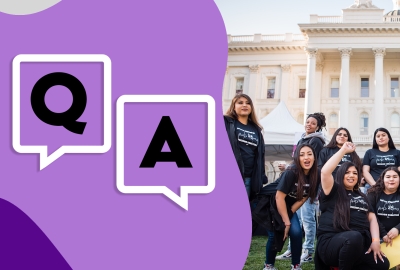
Dr. Shabnam Javdani and Jessica Nowlan, executive director of Young Women's Freedom Center, sat with On the Ground to discuss the role of their research and partnership in working with girls, young women, and TGNC young people towards decriminalization, decarceration, abolition, and reimagining the juvenile justice system response. Their conversation was edited for clarity and length.
How has this partnership influenced your approaches to research and advocacy?
Shabnam Javdani: It’s about the reimagination and the boldness of ideas. The YWFC was engaged in participatory action work before there was a name for that. They’re about how the simplest act of care and liberation is the most meaningful and the most important to not forget: Do you have a place to go? Are you safe there? What would you like your life to look like? And then translating that into the most micro of skills: Do you listen to a child when they talk to you? How do they know that you're listening to them?
Are we designing interventions and applying research paradigms in a way that makes sense for the folks who are experiencing the most disenfranchisement? To be able to understand that we have to figure out ways to measure those daily radical acts that seem so small, but are so meaningful.
As researchers, we tend to learn about incremental work. We conduct a study and then we add a variable. Then we add a little thing and then we write about how it was so great that we added that thing to the study. The YWFC said “we are ending incarceration by 2030.”
I said, okay, I want to be part of this. How do I do that? What is my 2030 goal? Publish 10 more papers? Who cares? It just takes away the constructed power of what is our currency in academia and reminds you about the real world. Seeing how the YWFC has big goals and small daily acts of care are so important to me. I have tried every way possible to embed that in my thinking as a researcher.
Jessica Nowlan: Our work started in 1993 in San Francisco at the height of the AIDS epidemic. It was the war on drugs and many of our parents were strung out on dope and there was bad heroin on the streets. Our founding Executive Director, Rachel Pfeffer, was doing research on young people that lived and worked on the streets. She was examining the power and resilience of young folks who have been discarded by society, but who built community and safety with each other to survive. We have survived.
What happens when you create space for folks who have been oppressed to develop critical consciousness and lean into our skills as folks that have survived, that have hustled, that have continually faced death in the face, on a daily basis? There is a power that emerges.
Research has been a tool to weaponize our work and discount our work by systems and those with power. When we first started, youth development wasn't a thing that was emerging. Evidence-based practices wasn’t a big thing yet. Gender response wasn't a thing either. And yet if you read that research we were intuitively doing all of that because that's what it means to take care of each other. If you use the abolitionists framework, we are not creating alternatives to incarceration. We are and have built an alternate ecosystem.
But there isn't documentation of our work. We have not been able to get funding because we haven't been able to prove our evidence-based practices, yet we reduce recidivism sometimes 95% per year.
We want to really share this model with the broader public in a very real way, to document and demonstrate the outcomes of our work. We've put in the work, we've earned it.
This particular partnership with NYU is so powerful because we’re actually applying what we do and pushing the limits. We know what our model of community care looks like and we know what transformative justice looks like. We are demanding something different and research is really important to make that happen.
Javdani: You use the word weaponize. I think that is the right word. In doing deep work, you and the YWFC illuminate the real challenges that are being experienced by young people. That work becomes of interest to the powers that be, but they apply the same typical top down models to understanding, consuming, and trying to intervene in the challenges that you are bringing up. When that happens, organizations take a contextual and structural problem that you have identified and will apply the approaches to research that psychology most often relies on, which is how do we measure this within the individual person?
They think the reason that differences exist is because there's something different about the people in this group than the people in that group.” And then they come up with a solution to fix the people and lose the structural lens altogether. That is the weaponization of information and how it delegitimizes structural challenges and reduces them to individual pathology. It also means that they come up with individual level solutions with fancy names and registered trademarks like “evidence-based.” Then these organizations come back to YWFC, the source of that knowledge, to say, how do we know what you're doing is evidence-based?
That's the pattern of weaponization that you're talking about. I hadn’t put it together in that way until right this moment. I thank you for that. I think that it is a very important dimension of the ways that partnerships like ours can resist that pattern.
“Through Their Eyes” includes a glossary of terms to help the reader understand the contexts and phrases used throughout the report. The first defined term is Community Experts. This refers to the people interviewed for this study. Most research projects use the terms participant or research subject. Why did YWFC decide to use Community Experts for the report?
Nowlan: First, I have to credit that to Jocelyn Mati, who was one of the researchers. She came up with the term. Community Experts are people that have experienced the harm of these structures and systems and are actually the experts we need to be listening to. The Community Experts that we talked to in this report and the Community Experts we talked to in 1993 are saying the same things and we do not listen. Like Shabnam was saying earlier, it's all put on the person. “Oh, you're broken, let's fix you. Your family's broken. Your community's broken.” All of our Community Experts have been saying the same thing for over 20 years:
You need connection to the community. You need housing where you can have self-determination and agency over your own lives. It's not that hard. It’s important for us that we’re centering these people as experts and meeting people where they're at. We hold them in their humanity and dignity for their expertise and that is just super important to us.
Javdani: These are folks that YWFC developed a sustained trusting relationship with beyond the kind of “do no harm” minimum of the standard IRB. It completely opens up what it is shared.
Nowlan: There is nobody in the probation department at city hall that knows more than them [young people], personally and historically, about how San Francisco has ravaged the Black communities through systems and in carceral space. Those voices need to be uplifted.
YWFC involved youth as part of the “Through Their Eyes” research team. YWFC invested in their training and taught them qualitative data analysis and other research skills. In the report, you refer to the young people as “equal partners” in the research process. Can you talk about the process of “partnering” with these young people? What has their reaction or response been to the work?
Nowlan: When we first started in 1993, we were not a youth employment project. We were a radical grassroots organization that hired folks from the community, did deep training, and paid double minimum wage. Many of us were working in the underground street economy, but now we had economic choice. We had community and space to begin to question and to contextualize our lives in the context of the world. Together, we were making organizational decisions and had agency in our jobs.
We did community health, education, outreach, HIV testing, needle exchange, because we could go to places that other people can’t. We’d be up in the strip clubs. We'd be talking to pimps to try to talk to the girls. We’re going to the buses. We're in the nail shops and we're up in the projects.
Our staff has 70 people now across four sites throughout California, but we will never have less than 45% of our staff under the age of 24. The majority are directly impacted [by systems]. When folks join YWFC, they are going to unlearn some stuff and they’re going to listen. These youths are their colleagues. A sis that's 14 that's on the ankle monitor, that's your colleague. That's not a youth participant. You have some skills to teach her and she definitely has some skills to teach you.
The traditional researchers maybe don't have those connections to the community like that, but we do because of our partnership with young people. That is our organizational genealogy.
Javdani: This is a partnership where we don't need to ask YWFC to do anything differently. It's our job as NYU researchers to systematically document what is going on and to understand the depth of what goes into their work.
You can imagine how difficult it would be for research directors to be so careful to lay out that incredible participatory collaborative process and outreach where the research is the support and the support is the research. How do you zoom out and then document that as well?
That is the information that I would like to generate for an applied scholarly community. Not just in academia, but also in the non-profit sector. Those communities need to know what YWFC’s model looks like and they need to understand its processes, its hoped-for outcomes, and its actual outcomes. That information is so missing from the scholarly literature.
Nowlan: We're working on strategies to shut down institutions and divert millions of dollars from policing and probation to community in four California counties. But no matter what, folks will ask us “show us your models.” To me, the effective models are grassroots. It's folks that are taking their time going deep and have strong political analysis. It is just so important right now, I think more than ever, for us to document what we do.
The report says “we hope that the readers of this report take the experiences shared here seriously and see it as a call to action to abolish systems of harm and envision communities that nurture all young people.” Who do you hope listens to the stories in the report?
Nowlan: It sounds cheesy, but it takes all of us. YWFC has a freedom charter that was developed over three years by about 300 to 400 directly impacted cis and trans women and girls, trans young men, trans men and boys and gender expansive folks in California. We modeled it after the South African freedom charter. We thought a bill of rights is kind of good, but it's kind of whack because it's just symbolic.
For us, our freedom charter is our North Star. Yes, we’re a nonprofit and there is a whole nonprofit model that really isn't supportive of the world we're trying to create.
To me, this report is a call to action for everyone. If you’re in philanthropy, where are you putting your money? If you are working within the system, what is your call to action, both in the short-term and long-term? What does that mean if you're in academia? What is research you're thinking about lifting up, writing, and sharing? The world that YWFC is creating is very different. It's not an alternative, it's a different ecosystem.
All of us have to within our space, push the envelope and also do the work. That work means taking the leadership of those that have experienced the most corrosive injustice in our society — young folks, trans folks, black folks, folks of color — that understand both personally and historically the harm of the carceral state, anti-blackness, patriarchy, and capitalism in our country.
Related Blog Posts
Reexamining the Link Between Pregnancy Intentions and Maternal, Newborn & Early Life Outcomes
Dr. Sarah Cowan received an IHDSC Seed Award in 2019-2020 for a project that reexamines and extends previous research on the links between pregnancy intentions and early life outcomes by analyzing data from the Pregnancy Risk Assessment Monitoring System (PRAMS) and 2-year follow-up data from six states.
Q&A: Dr. Paula Chakravartty and Dr. Michelle Buckley
Drs. Paula Chakravartty (NYU) and Michelle Buckley (University of Toronto) partner with Khabar Lahariya, an India-based rural feminist media collective, to create lasting impact for brick kiln workers in Uttar Pradesh. On the Ground interviewed the researchers to learn about how this partnership helps to design the research, as well as the ways in which the research feeds back into the lives and work of migrant workers.



